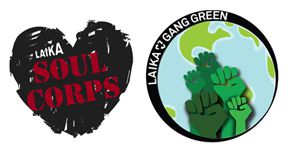Sustainabilty at Laika Animation
Last weekend I attended the media arts conference put on by Lane Community College in Eugene, OR. LCC has a very competitive media arts production program. I attended a Q&A with Mark Shapiro, the business face of Laika animation studios in Portland (best known for Coraline), and queried him about their efforts at sustainable production. Mark replied that in Southeast Portland recycling is the norm and this culture of awareness has made its way into their office. They bike to work, recycle what they can, and turn off the lights around the office. He explained, however, that the company does not have a process for assessing its overall environmental/energy footprint and that that it takes a lot of energy to run their computer systems and is not entirely sure what goes into the resins and other material components of the new 3D printers they are using for all their stop motion characters. Most electricity in Portland comes from hydropower, which greatly reduces fossil fuel burning but has a detrimental impact on salmon runs. (FYI – The Dalles Dam, which was built in the 1950s to supply Portland’s growing suburbs, was built on the site of Celilo Falls, a traditional fishing and trade site for local indigenous communities.) Mark gave me hope though that people within the media industries are become more aware of the need to adopt sustainable production practices. Mark appreciated the question and I left feeling impressed that people in the media industires are interested and paying attention to environmental practices. FYI: Laika has a new film, ParaNorman, scheduled for release in 2012.
Here is Laika’s section on sustainability in their company mission statement.
 Our sustainability program, Gang Green, promotes ecology within the company and around our neighborhoods. We support local sustainable businesses and give back to organizations that promote conservation.Â
Our sustainability program, Gang Green, promotes ecology within the company and around our neighborhoods. We support local sustainable businesses and give back to organizations that promote conservation.Â
Many of us take part in our annual Green Exchange contest, where employees earn points for bringing in recyclables, including bike tire tubes, wine corks and tennis shoes. Items are collected and donated to area organizations, including Junk to Funk. We even accept recyclables that city haulers won’t take.
In 2011 we began receiving rigid plastics and bags and also rolled out a composting program where we collect food waste, coffee grounds, tea bags, compost-friendly cutlery and cups and paper towels, reducing our overall waste to the landfill. Finally, Alternative Transportation Incentives are offered to employees who regularly carpool, walk, bike, vanpool or use mass transit. Currently, we have nine vanpools in the Portland metropolitan area that keep over 80 cars off the road every day.